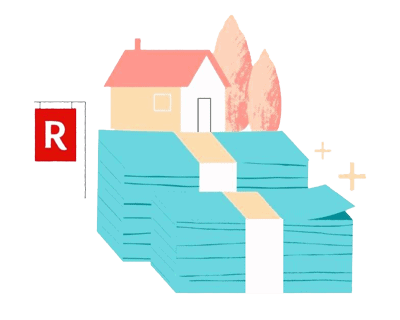Depending on the loan amount you need and where you’re buying a home in Maryland, you may find it difficult to find financing beyond the conforming loan limits. This is where jumbo loans come into play. Whether your sights are set on a home in Baltimore or a sprawling property Ellicott City, join us as we delve into the intricacies of jumbo loans in Maryland in 2024.

What is a jumbo loan?
A jumbo loan in Maryland is a type of mortgage that is used to finance homes that exceed the conforming loan limits set by the Federal Housing Finance Agency (FHFA). Oftentimes, this type of loan is necessary for high-end, luxury homes or homes located in expensive housing markets.
If the home you’re purchasing will require you to borrow more than the conforming loan limit (CLL), you’ll need to apply for a jumbo loan. But because of the larger loan amounts and increased risk for lenders, Maryland jumbo loans often come with higher interest rates and stricter requirements than conventional loans. For instance, a larger down payment and a higher credit score may be required to qualify for a jumbo loan.
Deciding between renting or buying your next home? Explore your options.

Deciding between renting or buying your next home?

In 2024, the conforming loan limit for a single-family home in most markets is $766,550. However, these limits can vary depending on where you’re buying a home in Maryland.
- $766,550 is the conforming loan limit in most Maryland counties
- $1,149,825 is the maximum limit in higher-cost counties
Keep in mind that the loan amount is what determines whether or not you’ll need a jumbo loan, not the price of the home you’re buying. So, if you were to put $100,000 down on a $780,000 home in Baltimore County, the loan would be $680,000, which is under the conforming loan limit for this area. In this case, your loan wouldn’t be considered a jumbo loan.
The following counties in Maryland have a conforming loan limit beyond $766,550 for 2024:
| County | FHFA Conforming Loan Limit |
| Calvert County | $1,149,825 |
| Charles County | $1,149,825 |
| Frederick County | $1,149,825 |
| Montgomery County | $1,149,825 |
| Prince George’s County | $1,149,825 |
This FHFA map will give you more specific information related to the conforming loan limits in your county.

House hunting made easy
What are the requirements for a jumbo loan in Maryland?
As previously mentioned, the requirements for a jumbo loan are much more stringent than a conforming loan. The specific requirements can vary from lender to lender, but below are the typical requirements for borrowers seeking a jumbo loan in Maryland.
Higher credit score: When it comes to receiving a jumbo loan, credit score requirements are typically more stringent than for conventional mortgages. It’s possible that some lenders may accept a lower score, a credit score of at least 720 is generally required to qualify for a jumbo loan. It’s essential to have a strong credit profile and a solid financial history to increase your chances of being approved for a jumbo loan.
Larger down payment: Obtaining a jumbo mortgage typically requires a larger down payment compared to a conventional mortgage. Lenders may require a down payment of 10% to 20% or more, depending on the specific loan program and the borrower’s financial situation. If you’re approved with a down payment less than 20%, keep in mind you’ll most likely be required to purchase private mortgage insurance (PMI).
More assets: Jumbo loan lenders generally require borrowers to demonstrate a strong financial profile, including substantial liquid assets or savings. To qualify for a jumbo loan, borrowers must have enough reserves to cover at least one year of mortgage payments. This requirement ensures that borrowers have the financial flexibility to meet their loan obligations in the event of a financial hardship.
Lower debt-to-income ratio (DTI): A lender will typically require a debt-to-income ratio (DTI) of under 43% for jumbo loan borrowers, although a DTI closer to 36% is preferred. This ratio is calculated by dividing the sum of all monthly debt payments by the borrower’s gross monthly income. A lower DTI indicates a stronger ability to repay the loan and can help borrowers secure more favorable terms and rates. It’s important for Maryland borrowers seeking a jumbo mortgage to have a clear understanding of their DTI and take steps to improve it if necessary.
Additional home appraisals: Mortgage lenders may require a second home appraisal as an extra layer of protection when it comes to jumbo loans. The second appraisal serves as an additional opinion to ensure the property’s value aligns with the loan amount. In places with limited comparable property sales, this additional appraisal may cost more than in neighborhoods with more frequent sales.



























 United States
United States Canada
Canada